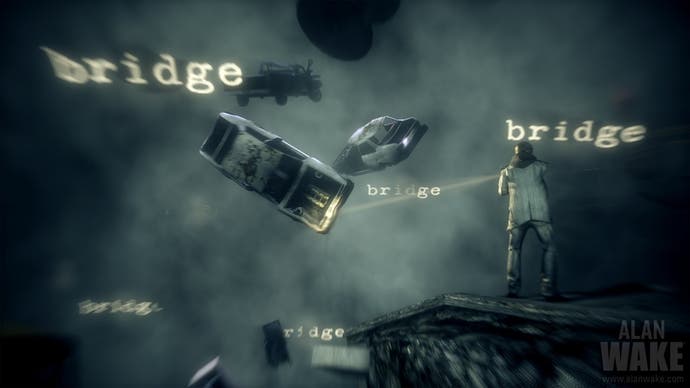Alan Wake: The Writer
Sleepy sendoff.
Zane was a perplexing figure in the original game, but The Writer gives us our closest look at the luminescent interloper yet. It turns out that Zane is like the charmer who catches your eye with an insouciant smirk from across the room, except that when you approach, you learn he was just trying to work some spinach out of his teeth. His appeal lies only in his mystery.
In The Writer, we observe that Zane's hobby is stating the obvious. Hey! That's Wake's hobby, too. Soulmates!
Anyone who played The Signal knows that Wake is sinking into the darkness of his psyche and he has to fight his way out. Yet Wake and Zane delight in repeating this well-understood premise back to each other, in various permutations, a veritable Dueling Banjos of needless exposition.
If you wonder why I've focused so much on character in this review, it's because The Writer is an extremely character-driven episode, and not coincidentally, Alan Wake's weakest. The game is at its worst when it relies on character study, for the simple reason that its characters are not that engaging.
Yet Alan Wake is very good at crafting ambience, and that talent shines in the one memorable segment of The Writer, when Wake falls into a spectral house that has drifted free of its moorings. As I attempted to navigate a rotating patchwork of interiors from Wake's subconscious – his living room melts into a mining elevator, which descends into another memory fragment entirely – the movement controls felt inadequate. Wake slammed into walls, and I forgot which way was up.
And that was perfect, because the sequence evoked one of those nightmares where you forget how to run – where all of a sudden, the technique of putting one foot in front of the other is an impossible secret.

The dream spiral was a daring moment, and Alan Wake has had too few of those. The game initially seemed bold because its idea of a nuanced adult psychodrama was so much more mature and distinctive than the genre-based fare that surrounded it on store shelves. But having come to the end of the Alan Wake saga, I've concluded that the game represents a daring idea executed in the most timid manner possible.
From start to finish, Alan Wake has been plagued by a fear that you, the player, will abandon it. Every "push this blinking green button to advance" moment, every time Wake recapped the situation to be double-triple sure you understood, every bit of symbolism explained away (and deadened) by Thomas Zane's psychobabble – they're all idiosyncrasies of developers with an unforgivable lack of confidence in their work and their audience. The game's neediness is its most overwhelming disappointment.
The timidity is exacerbated by the game's format, a retail release plus downloadable expansions. What is the "canonical" version of Alan Wake? The game on disc? The disc plus the downloads? The creators don't know, so they've hedged their bets. The Writer sketches out an ending so pat, expected, and insubstantial that I had to laugh at how diligent it was in failing to make any progress beyond the original game.
At least those of us who played the expansions didn't get a leg up on the disc-only folk. This appears to have been Remedy's goal, after all. From the outset, they've dulled the bold strokes of the Alan Wake concept in a desperation to ensure that everyone got the complete experience. Well, I got it. And I'm left pining for what could have been.
Alan Wake: The Writer is released today on Xbox Live for 560 Microsoft Points (£4.76 / €6.72).



